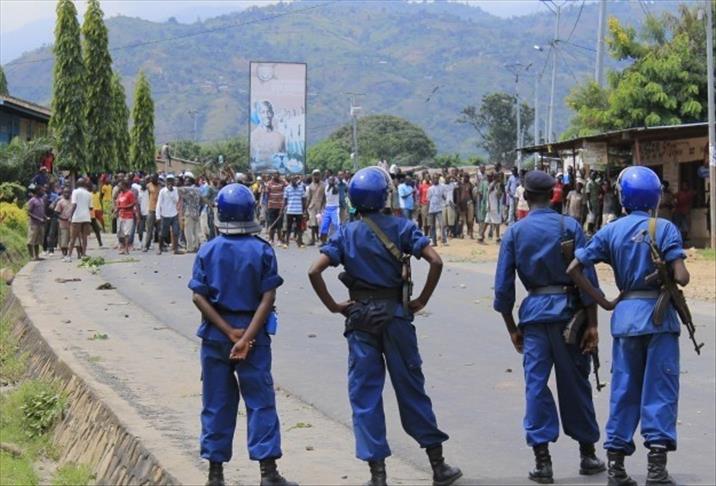
By Felix Nkambeh Tih
ANKARA
Despite UN calls for political dialogue, international pressure and an opposition boycott, Burundian President Pierre Nkurunziza ran for, and won, a third term in office in controversial polls held on July 21.
Since then, Burundi has witnessed a spate of violent attacks, especially in the capital Bujumbura, sparking fears that the country could plunge into fresh conflict.
Even before the latest wave of violence, Burundi had been in crisis since April, when the ruling National Council for the Defense of Democracy named Nkurunziza its candidate for the presidency.
Along with violent protests against his planned third-term bid, in which scores of people were killed, Nkurunziza also faced a coup attempt in May, when several top generals attempted – but ultimately failed – to overthrow him while he was attending a summit in Tanzania.
The coup leaders have since regrouped in Rwanda, Burundi's northern neighbor, where they have vowed to continue to fight the Nkurunziza regime.
Nkurunziza was re-elected for a third term with 70 percent of the vote. His opponent Agathon Rwasa, leader of the National Liberation Forces, received 18.99 percent of the vote.
Nkurunziza's party also won 77 out of 100 seats in parliamentary elections that sections of the opposition boycotted.
Attacks in Bujumbura
Some observers suspect the Rwanda-based coup plotters of being behind the recent wave of attacks, especially the assassination of General Nshimirimana, the country’s powerful spy chief and a Nkurunziza ally.
“According to Bujumbura, the leaders of the failed coup are now based in Rwanda and the attacks seen in the past weeks are all driven from a base located in the south of Kagame’s country [Rwanda],” Desire Zongo, an Ivorian political scientist specialized in African affairs, told Anadolu Agency.
Pascal Niyonizigiye, a political science professor at the University of Bujumbura, believes that the Rwanda-based generals have supporters in Burundi.
“It is difficult to know who exactly is behind the killings,” Niyonizigiye told Anadolu Agency. “But they could not have been carried out without the complicity of internal elements.”
“The circumstances of General Nshimirimana’s assassination indicate that the attackers are well organized,” he said. “They must have had considerable influence and resources in order to thwart such an important personality’s security detail.”
Since April, gunshots and grenade attacks have been reported throughout the streets of Burundi’s capital and dead bodies are found in every corner of Bujumbura on a daily basis.
According to Human Rights Watch, Nkurunziza’s security apparatus – including the ruling party’s youth league, known as the “Imbonerakure” – have arbitrarily arrested scores of suspected opponents in recent months.
Action against Nkurunziza
In response to the question as to whether the failed coup plotters have become a de facto rebel group, Zongo said that "the situation in Burundi is unique. The ruling CNDD-FDD, in power since 2005, was itself a rebel movement."
"Who can be called a rebel there? Let us not forget that Nkurunziza himself was a rebel sentenced to death for killing civilians," Zongo said.
Nkurunziza came to power following the 2005 Arusha agreement, which – along with ending the Hutu-Tutsi civil war – stipulated that Burundi's president should not serve more than two terms in office.
"During Nkurunziza’s second term, Agathon Rwasa, leader of the FNL, was considered a rebel and chased out of Bujumbura. He came back some weeks ago to take part in the elections," Zongo said.
"He has surprisingly been elected vice president of the parliament while General Godefroid Niyombare, the former head of the army under Nkurunziza, is now his main enemy,” he said. “There is nothing set in this country; situations and alliances are really fluid."
Agathon Rwasa came second in the presidential elections and his party won over 20 seats in the parliamentary elections.
Fears of escalation
On Aug. 16, Nkosazana Dlamini-Zuma, chairperson of the African Union Commission, condemned Bikomagu’s assassination, which took place the previous day.
She went on to stress "the need for dialogue and consensus to find a peaceful and lasting solution to the current crisis."
Zongo told Anadolu Agency that statements condemning the violence were not enough.
He conceded, however, that for the first time in such a crisis the African Union had a clear position against Nkurunziza's third term.
The African Union could do more than this however, he said.
Zongo believes that the UN-sponsored political dialogue between all stakeholders involved in the Burundian crisis must resume immediately.
On the question of whether the country may plunge into another civil war, Zongo told Anadolu Agency that "Burundi is very weak economically; another war will make the situation worse."
"There are pressures on both sides, opposition and government, to resume negotiations," he said. "That is the only way to prevent Burundi from falling back into civil war, which devastated the country two decades ago."
Anadolu Agency website contains only a portion of the news stories offered to subscribers in the AA News Broadcasting System (HAS), and in summarized form. Please contact us for subscription options.

